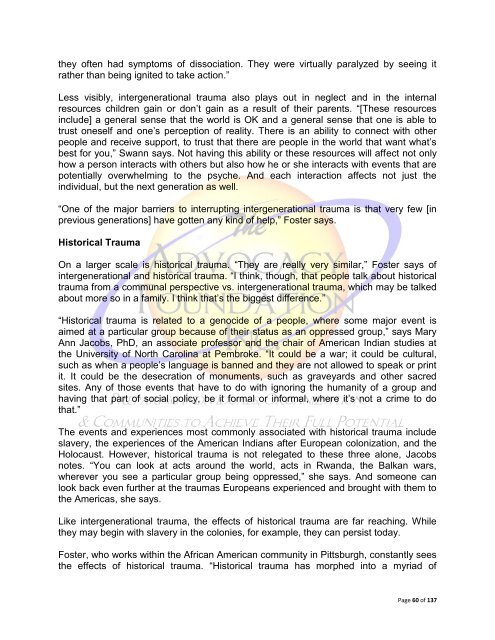Generational Progression
Generational Progression
Generational Progression
Create successful ePaper yourself
Turn your PDF publications into a flip-book with our unique Google optimized e-Paper software.
they often had symptoms of dissociation. They were virtually paralyzed by seeing it<br />
rather than being ignited to take action.”<br />
Less visibly, intergenerational trauma also plays out in neglect and in the internal<br />
resources children gain or don’t gain as a result of their parents. “[These resources<br />
include] a general sense that the world is OK and a general sense that one is able to<br />
trust oneself and one’s perception of reality. There is an ability to connect with other<br />
people and receive support, to trust that there are people in the world that want what’s<br />
best for you,” Swann says. Not having this ability or these resources will affect not only<br />
how a person interacts with others but also how he or she interacts with events that are<br />
potentially overwhelming to the psyche. And each interaction affects not just the<br />
individual, but the next generation as well.<br />
“One of the major barriers to interrupting intergenerational trauma is that very few [in<br />
previous generations] have gotten any kind of help,” Foster says.<br />
Historical Trauma<br />
On a larger scale is historical trauma. “They are really very similar,” Foster says of<br />
intergenerational and historical trauma. “I think, though, that people talk about historical<br />
trauma from a communal perspective vs. intergenerational trauma, which may be talked<br />
about more so in a family. I think that’s the biggest difference.”<br />
“Historical trauma is related to a genocide of a people, where some major event is<br />
aimed at a particular group because of their status as an oppressed group,” says Mary<br />
Ann Jacobs, PhD, an associate professor and the chair of American Indian studies at<br />
the University of North Carolina at Pembroke. “It could be a war; it could be cultural,<br />
such as when a people’s language is banned and they are not allowed to speak or print<br />
it. It could be the desecration of monuments, such as graveyards and other sacred<br />
sites. Any of those events that have to do with ignoring the humanity of a group and<br />
having that part of social policy, be it formal or informal, where it’s not a crime to do<br />
that.”<br />
The events and experiences most commonly associated with historical trauma include<br />
slavery, the experiences of the American Indians after European colonization, and the<br />
Holocaust. However, historical trauma is not relegated to these three alone, Jacobs<br />
notes. “You can look at acts around the world, acts in Rwanda, the Balkan wars,<br />
wherever you see a particular group being oppressed,” she says. And someone can<br />
look back even further at the traumas Europeans experienced and brought with them to<br />
the Americas, she says.<br />
Like intergenerational trauma, the effects of historical trauma are far reaching. While<br />
they may begin with slavery in the colonies, for example, they can persist today.<br />
Foster, who works within the African American community in Pittsburgh, constantly sees<br />
the effects of historical trauma. “Historical trauma has morphed into a myriad of<br />
Page 60 of 137

















